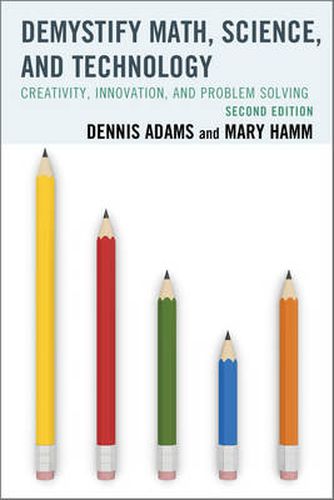Readings Newsletter
Become a Readings Member to make your shopping experience even easier.
Sign in or sign up for free!
You’re not far away from qualifying for FREE standard shipping within Australia
You’ve qualified for FREE standard shipping within Australia
The cart is loading…






In a rapidly evolving local and global economy, skills related to mathematical problem solving, scientific inquiry, and technological innovation are becoming more critical for success in and out of school. Thus, Demystify Math, Science, and Technology addresses the need to cultivate these skills in young students so that ingenuity, teamwork, and imaginative skills become part of their arsenal in dealing with real world challenges. This whole package of attributes is essential for learners imagining new scenarios and future work in areas that don’t even exist yet.
Another important issue is that teachers now deal with students who span the entire spectrum of learning. Students differ widely in levels of preparedness, personal interests, and cultural ways of seeing and experiencing the world. One size does not fit all. Teachers need to learn to turn diversity into an advantage because innovation builds on the social nature of learning; the more diverse the inputs, the more interesting the outputs. The authors also believe that no one should be sidelined with basic skill training in a way that keeps them away from the creative and collaborative engagement associated with problem solving, inquiry, and the technological products of math and science.
$9.00 standard shipping within Australia
FREE standard shipping within Australia for orders over $100.00
Express & International shipping calculated at checkout
In a rapidly evolving local and global economy, skills related to mathematical problem solving, scientific inquiry, and technological innovation are becoming more critical for success in and out of school. Thus, Demystify Math, Science, and Technology addresses the need to cultivate these skills in young students so that ingenuity, teamwork, and imaginative skills become part of their arsenal in dealing with real world challenges. This whole package of attributes is essential for learners imagining new scenarios and future work in areas that don’t even exist yet.
Another important issue is that teachers now deal with students who span the entire spectrum of learning. Students differ widely in levels of preparedness, personal interests, and cultural ways of seeing and experiencing the world. One size does not fit all. Teachers need to learn to turn diversity into an advantage because innovation builds on the social nature of learning; the more diverse the inputs, the more interesting the outputs. The authors also believe that no one should be sidelined with basic skill training in a way that keeps them away from the creative and collaborative engagement associated with problem solving, inquiry, and the technological products of math and science.